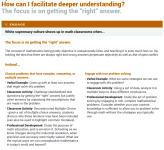Jimmy Higgins
Contributor
- Joined
- Jan 31, 2001
- Messages
- 45,986
- Basic Beliefs
- Calvinistic Atheist
So the right-wing Internet lost it's mind over Math Equity. Of course, the right-wing is fast to lose their shit over anything that dares to question inertia. One thing that popped up with 'showing work'. I figured this was taken out of context, and I think in part it is... but in part, it seems kind of crazy, though there can be a context I suppose I'm not thinking of.
Okay, this does confuse. In the next page, there is a 'reflection' section about how students can otherwise show mastery. To me, that indicates trying to think outside the box as a teacher (though of course, the poor teachers have enough trouble trying to teach kids). It is a nice philosophical question. But the above "worship of the written word" and "paternalism"? What now? Maybe I'm not getting the phrase right, but to me, "showing the work" is to indicate the process that the student is undergoing to get to the answer. It helps prevent cheating and if an error in calcs is made, credit can still be applied to the work, if an appropriate method. Showing the work, provides a student an opportunity to solve in an alternate way (if reproducible for other types of problems).
I'm not one to say rethinking methods is a bad idea (except fuck you LRFD), but what they present above, does seem misguided, convoluted, and wildly off-target.
Then I go down more on "real world math"... and we get this:
Is the rest of Math Equity this problematic?
linkMath Equity Toolkit said:Math teachers ask students to show work so that teachers know what students are thinking, but that centers theteacher’s need to understand rather than student learning. It becomes a crutch for teachers seeking to understandwhat students are thinking and less of a tool for students in learning how to process. Thus, requiring students toshow their work reinforces worship of the written word as well as paternalism.
Okay, this does confuse. In the next page, there is a 'reflection' section about how students can otherwise show mastery. To me, that indicates trying to think outside the box as a teacher (though of course, the poor teachers have enough trouble trying to teach kids). It is a nice philosophical question. But the above "worship of the written word" and "paternalism"? What now? Maybe I'm not getting the phrase right, but to me, "showing the work" is to indicate the process that the student is undergoing to get to the answer. It helps prevent cheating and if an error in calcs is made, credit can still be applied to the work, if an appropriate method. Showing the work, provides a student an opportunity to solve in an alternate way (if reproducible for other types of problems).
I'm not one to say rethinking methods is a bad idea (except fuck you LRFD), but what they present above, does seem misguided, convoluted, and wildly off-target.
Then I go down more on "real world math"... and we get this:
Again, starts off on a potential philosophical, lets think about how we think about this... and then seems to derail into insanity.Math Equity Toolkit said:Often the emphasis is placed on learning math in the “real world,” as if our classrooms are not a part of the realworld. This reinforces notions of either/or thinking because math is only seen as useful when it is in a particularcontext. However, this can result in using mathematics to uphold capitalist and imperialist ways of being and understandings of the world.
Is the rest of Math Equity this problematic?

